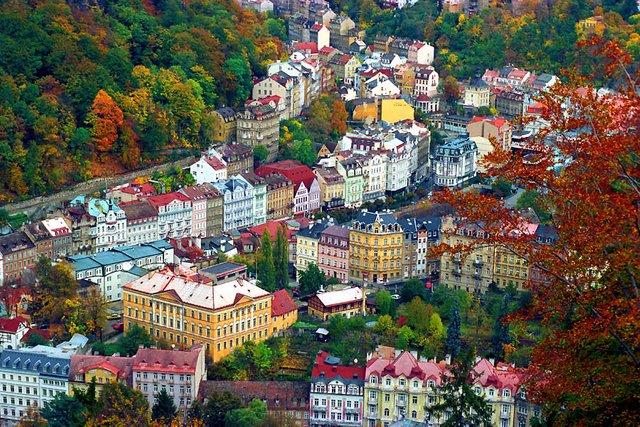The lovely old spa town of Karlovy Vary in the Czech Republic is where one of the most unusual drinks in the world has always been made - Becherovka.
Time for A Special Drink in Karlovy Vary
It's famed for its naturally hot spring waters, spa treatments, its elegant 18th and 19th century hotels and public buildings, its classical concerts and its opera house – plus its very own warm-water river, the Tepla – but Karlovy Vary in the west of the Czech Republic is famous for something else too.
Devotees of a very unusual drink also make their way here to where it's been made for two centuries. They come to visit the museum dedicated solely to its history and production and the place where its still secret recipe was first concocted and tried out. Karlovy Vary has twelve natural springs; many consider Becherovka to be its 13th!
Starting out as a Medicinal Tonic
Becherovka was the brainchild of Josef Becher, a pharmacist from the town who, in 1807, started selling bitters made to his own recipe as a medicinal tonic. In 1841, he passed on his budding business to his son and heir Johann.
But what does Becherovka consist of? It's mainly alcohol (38%), local spring water and sugar but its unique spicey/herbal flavour comes from the addition of anise seed, cinnamon, and approximately thirty two herbs, some of them obtained locally and the rest shipped in from India, South America and elsewhere. Only two people in the company at any one time know the precise contents and how to blend the drink.
After blending the mixture in large vats according to this secret recipe, the drink is then matured in large oak barrels for several weeks before it is bottled.
Exceedingly popular in the Czechoslovak Republic, across Eastern Europe and, increasingly, in many other countries worldwide, Becherovka is usually served ice cold and often drunk neat as an aid to digestion and as a health drink to (apparently) ward off colds and arthritis. But many devotees, me included, drink it mixed with tonic water, making a drink that is known as a beton (becherovka+tonic), a rather unfortunate portmanteau word because, in Czech, it means "concrete"!
Family Fortunes for Becherovka
It was Johann Becher who started large-scale production, and accordingly his name has been associated with the drink to the present day. It was first called Karlsbader Becherbitter. The name Becherovka was developed after World War I, when Bohemia became part of Czechoslovakia, and the sole legal language Czech.
Over the next hundred years (until 1945), the management of the company was passed down through the Becher family. After World War II, the company was nationalized by the then Communist Government but privatised again in 1997 and handed back to the family's descendents before being bought up by the French-based international liquor company Pernod Ricard in 2001.
The Museum Tour and Tastings are a Must
The Becherovka Museum is in the commercial part of the town and was the original production and storage factory before the whole process was scaled up because of increasing demand for the drink. Production is now located in larger premises outside the town.
On your conducted tour of the museum available in several languages, you'll be shown mock-ups of the mixing vats, a bottling plant using the characteristic green bottles with their blue and yellow labels, Canadian Oak maturing casks plus a range of Becherovka memorabilia including bottles of all shapes and sizes used through the ages together with historic weighing and spice blending equipment.
And there's a tasting included in your tour, not only of the traditional drink but of a newer version flavoured with lemon and a sweet liquor version good – according to my guide – for spreading over ice-cream.
For my taste, though, and I guess most aficionados, there's nothing to beat a traditional Becherovka and tonic on ice with a twist of lemon or lime. Heaven in a glass.

where's the Becherovka picture @yissakhar... you made me curious about how its look like.. hehehe
Downvoting a post can decrease pending rewards and make it less visible. Common reasons:
Submit
You and me both.
Downvoting a post can decrease pending rewards and make it less visible. Common reasons:
Submit
Thanks for your post, which I've found you after @cicisaja featured in her entry for the Pay It forward Contest
Downvoting a post can decrease pending rewards and make it less visible. Common reasons:
Submit
Found you through @cicisaja post I wish you well and good luck on the steemisfere
Downvoting a post can decrease pending rewards and make it less visible. Common reasons:
Submit